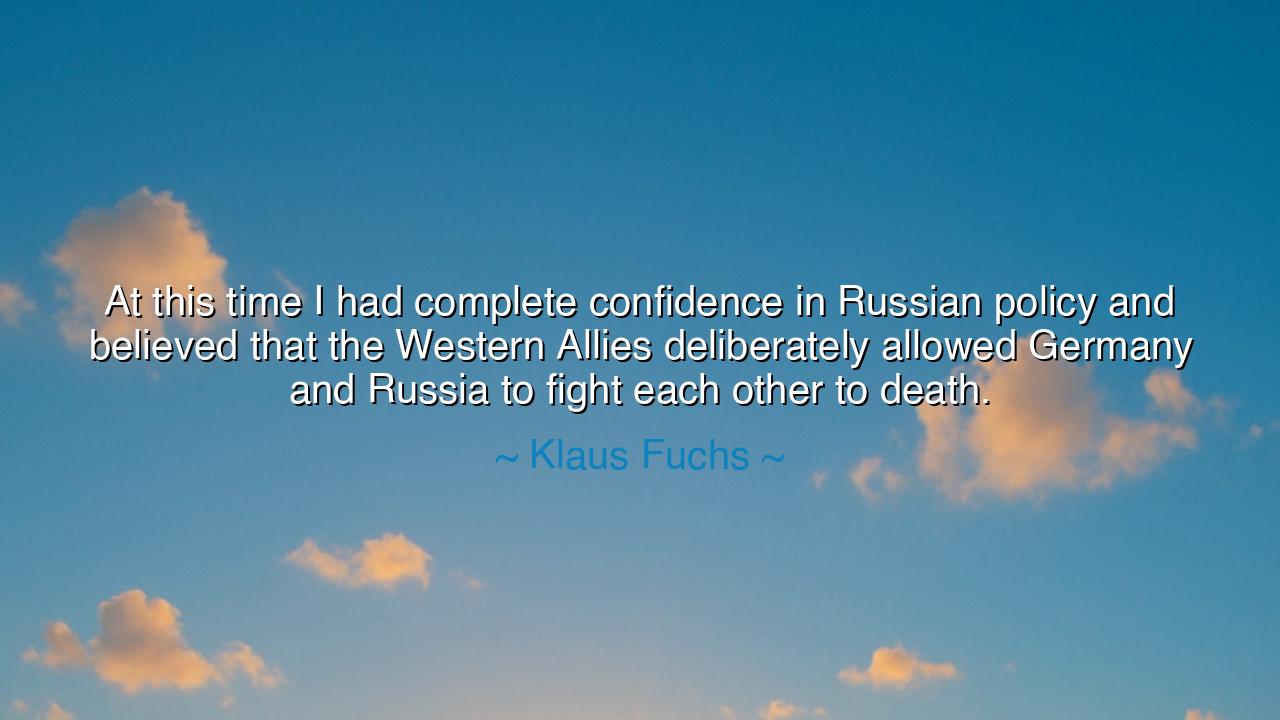
At this time I had complete confidence in Russian policy and
At this time I had complete confidence in Russian policy and believed that the Western Allies deliberately allowed Germany and Russia to fight each other to death.






In the somber confession of Klaus Fuchs, the atomic spy whose life straddled the borders of idealism and betrayal, we find a voice torn between conviction and regret: “At this time I had complete confidence in Russian policy and believed that the Western Allies deliberately allowed Germany and Russia to fight each other to death.” These words, spoken after his arrest, are not merely the admission of a man accused—they are a window into the moral storms of the twentieth century, when the world was divided by ideology and faith in truth was as fragile as glass. Beneath the surface of this quote lies a timeless warning about the blindness of loyalty, the peril of certainty, and the tragic cost of believing one’s cause to be infallible.
Klaus Fuchs was no ordinary traitor. He was a brilliant physicist, a man who helped shape the Manhattan Project, the effort that created the atomic bomb. But in his heart, he believed himself to be serving not two masters, but one truth—the triumph of socialism, the vision of a just and equal world he saw embodied in Russian policy. To him, the Soviet Union was not merely a state, but a faith, a flame burning against fascism and the greed of empires. When he spoke of his “complete confidence,” he was confessing the surrender of his own judgment to a higher creed. Yet as all prophets of ideology learn, faith untempered by doubt leads not to salvation, but to ruin.
His belief that the Western Allies “allowed Germany and Russia to fight each other to death” reveals the deep suspicion that defined the wartime mind. The world, in those years, was an intricate web of deceit and survival. The West, cautious of Stalin’s ambitions, delayed opening a second front; the Soviets, battered and bleeding, accused them of cowardice and betrayal. Fuchs, seeing the mountains of Soviet dead and the rivers of blood spilled in the East, concluded that the Allies valued balance of power above justice. His conclusion, born of both logic and emotion, shows the perilous intersection of truth and interpretation—how the fog of war can turn loyalty into resentment, and resentment into treachery.
History is filled with such men—those who, in seeking to serve humanity, become lost in the labyrinth of ideology. Think of Brutus, who struck down Caesar not from hatred, but from love of Rome, believing tyranny was slain by his dagger. Or of Oppenheimer, who, after unleashing the atomic fire, quoted the words of Vishnu: “Now I am become Death, the destroyer of worlds.” Each, like Fuchs, learned that the human soul cannot bear the weight of absolute belief. For when faith turns into fanaticism, and loyalty becomes blindness, even the purest motive may lead to destruction.
The true terror of Fuchs’s statement lies not in his politics, but in his certainty. He “had complete confidence”—and that is what doomed him. For in the world of men, confidence without conscience is a weapon more dangerous than any bomb. The lesson of his life is not one of espionage, but of moral humility: that no government, no ideology, no nation holds a monopoly on truth. The moment we cease to question what we serve, we become servants of something darker than ourselves.
Let the young and the wise alike take heed: the struggle between Russia and the West, between faith and fear, is not confined to the pages of history—it lives within every soul that must choose between loyalty and justice, belief and discernment. The ancients taught that wisdom lies not in certainty, but in the balance between doubt and duty. To act with conviction is noble; to question that conviction is divine.
So, children of tomorrow, when you hear voices that promise clarity in a world of shadows, remember Klaus Fuchs. Remember how his brilliance was dimmed by belief, how his conscience was consumed by cause. Let his life remind you that truth is never owned—it is sought, again and again, by those humble enough to listen. For the greatest danger is not in the wars between nations, but in the war within the heart: between the comfort of certainty and the courage of truth. And the one who masters that war—who holds faith but not blindness, conviction but not arrogance—will be free in ways no ideology can promise.






AAdministratorAdministrator
Welcome, honored guests. Please leave a comment, we will respond soon